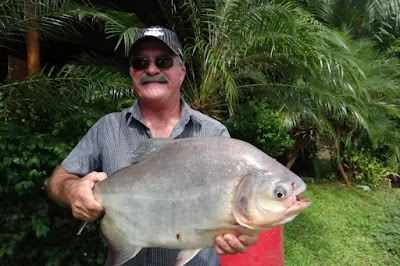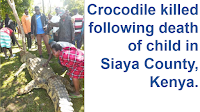The remains of a fisherman who went missing in the Rinyirru (Lakefield) National Park in northern Queensland, Australia, have been found inside two Crocodiles close to the area where he went missing. Kevin Darmody, 65, vanished while fishing with friends on the Kennedy River on 29 April this year, with witnesses reporting hearing a scream and a loud splash at about the time when he vanished. Following a search that lasted several days, local police located and killed two Saltwater Crocodiles, Crocodylus porosus, slightly upstream of the area where he went missing. To their surprise, Human remains believed to have come from Mr Darmody were found inside both Animals, something rare in cases of Crocodile attacks.
Crocodile attacks on Humans are relatively rare, but they are opportunistic ambush predators and will potentially attack anything going close to the water. Saltwater Crocodiles have a particularly poor reputation for such behaviour, being the largest species of Crocodile and notoriously aggressive. These Crocodiles are one of the few Crocodile species not considered vulnerable to extinction, being found from India to Australia and inhabiting many areas that Humans shun, such as Mangrove forests and islands without fresh water.
Despite this fearsome reputation, attacks by Saltwater Crocodiles are still unusual, with only 13 fatalities recorded in Queensland since records began in 1985, and only one other attack involving more than one Crocodile. Despite this, calls for a cull of Crocodiles in parts of Queensland where they come into conflict with Humans are common, particularly after attacks, and this incident has not been an exception. Crocodiles are protected in Queensland, where hunting led to their population falling to around 5000 in 1974. Since that time the population has recovered at a rate of about 2% per year, with the current population estimated at between 20 000 and 30 000, most of which live around Cape York and the Gulf of Carpentaria.
Conservationists in Queensland oppose a cull of Crocodiles not just because this would be bad for the Crocodiles, but because they do not believe it would be good for people. They argue that the likelihood of Crocodile attacks is more closely related to Human behaviour than Crocodile population density, and that a cull might make people more complacent in Crocodile habitats, and therefore vulnerable to attacks. Instead they argue for education campaigns to raise public awareness of Crocodiles and how to behave around them.
See also...
Follow Sciency Thoughts on Facebook.
Follow Sciency Thoughts on Twitter.








